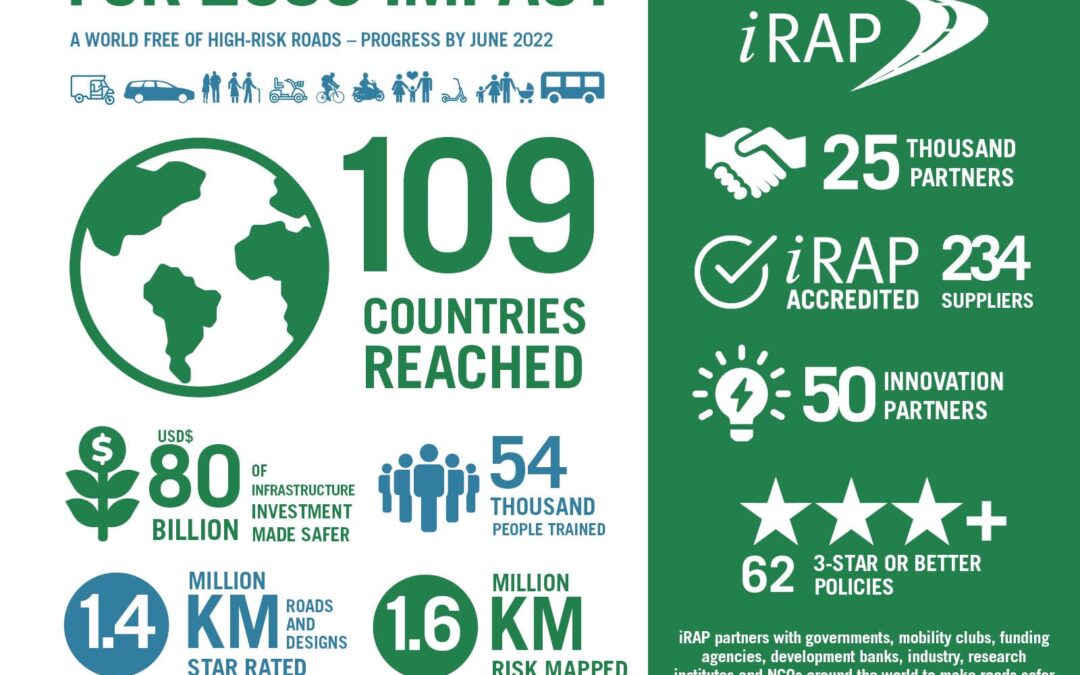As a charity, iRAP’s focus is on enabling others and creating locally-led programmes and partnerships for 2030 impact. Our latest metrics quantify and celebrate the safer roads and capacity building success of our 25,000 RAP partners worldwide.
iRAP global metrics are drawn biannually, and key highlights as at 30 June show:
Reach and assessments
Programme activities are influencing the safety of roads in 170 countries.
iRAP partners worldwide have undertaken over 1.4 million kilometres of Star Rating Assessments and Designs in 109 countries. This includes, in the last 6 months, first assessments for Andorra and Burkina Faso and significant Star Rating activity in Australia, Brazil, Indonesia, South Africa, India, Ghana, Dominican Republic and Nepal.
Star Rating for Designs (SR4D) is improving the safety of road designs and ensuring they meet the 3-star or better global standard before construction. Brazil has undertaken significant designs activity in the last 6 months.
A total of 1.6 million kilometres of Risk Mapping has been completed worldwide with new Risk Mapping in Spain, Tunisia and Slovenia since January.
Over 5.2 million kilometres of global road data is stored in iRAP’s free online software ViDA used by 14,262 registered users. An additional 425,000km has been added by partners since January.
Star Rating for Schools
The Star Rating for Schools (SR4S) Programme continues to grow in impact worldwide helping to inform safer school journeys and protect vulnerable youth.
The safety of 944 schools in 55 countries has now been assessed using the SR4S application.
First SR4S activity occurred in Costa Rica, Dominican Republic and Panama in the last 6 months. Countries leading the world in use of the application include Vietnam which has assessed 99 schools, India and Philippines (83 schools), USA (82), Uruguay (81), South Africa (66), Argentina (52) and Ghana (50).
Importantly, assessments have led to evidence-based safety upgrades in 217 schools. Post-construction Star Ratings have been produced for 118 locations with average Star Ratings before intervention found to be 2.5 stars, increasing to 4.7 out of 5 stars post-intervention – a wonderful safety result! Additional before and after intervention analysis found:
- The speed limit before interventions was 30km/h in 14% of the streets, and after interventions in 59% of the streets.
- Locations with no crossing facility decreased from 48% to 15%, while 12% of the locations received a raised crossing.
- Locations with no sidewalks reduced from 26% to 10%.
- Speed management increased from 18% to 65% of the assessed locations.
- The presence of school zone warnings increased from 40% to 75% in the locations assessed.
Training and Accreditation
Over 54,000 people have been trained in 159 countries in courses and events offered online and in-person (an additional 7.500 in the last 6 months). Many trainings are offered free-of-charge.
Training has been delivered in 17 languages including Albanian, Arabic, Bosnian, Bulgarian, Chinese, Croatian, Czech, Dutch, English, French, German, Greek, Hungarian, Icelandic, Indonesian, Italian, Japanese, Korean, Montenegrin, Polish, Portuguese, Romanian, Russian, Slovakian, Slovenian, Spanish, Swedish, Swiss, Thai and Vietnamese.
234 individual suppliers and 17 inspection systems are now accredited in 45 countries to support iRAP specification services worldwide.
In the last 6 months, first suppliers have been accredited in Argentina, Austria, Cameroon, Netherlands, Panama and Zambia. Significant capacity jump has been recorded this period in accredited supplier numbers in Tanzania (16 new suppliers thanks to the Ten Steps for Tanzania Project), Brazil (up 9), Argentina (up 6), Italy and Philippines (up 5) and Indonesia (up 3).
As we unite to implement the Global Plan for the Second Decade of Action for Road Safety and create a world free of high-risk roads, the ability for partners to upskill and support their own national RAP Programmes is being well-supported in a virtual self-paced environment.
Investment made safer
More than $80 billion of investment in 65 countries has been made safer informed by iRAP assessments.
Policy
62 global, national and provincial road safety strategies and investment schemes now include iRAP metrics and performance targets for safer road infrastructure – with a potential safer roads impact for every country on earth. Check them out here.
The work of iRAP and its partners would not be possible without the generous support of our major donor the FIA Foundation – our heartfelt thanks!
We applaud our partners’ success and encourage all countries to set their sights to 2030 and implementation of the Global Plan to achieve UN Targets 3 and 4 which include ensuring all new roads are built to a 3-star or better standard for all road users (Target 3), and more than 75% of travel is on the equivalent of 3-star or better roads for all road users by 2030 (Target 4).
Achieving >75 per cent of travel on 3-star or better roads by 2030 stands to save an estimated 450,000 lives every year and 100 million deaths and serious injuries over the 20-year life of treatments.
iRAP’s June 2022 metrics infographic can be downloaded in English, Spanish and Portuguese. Individual countries’ metrics are available via our Where We Work Map or by contacting Global Programme and Communications Manager Judy Williams on email judy.williams@irap.org

















